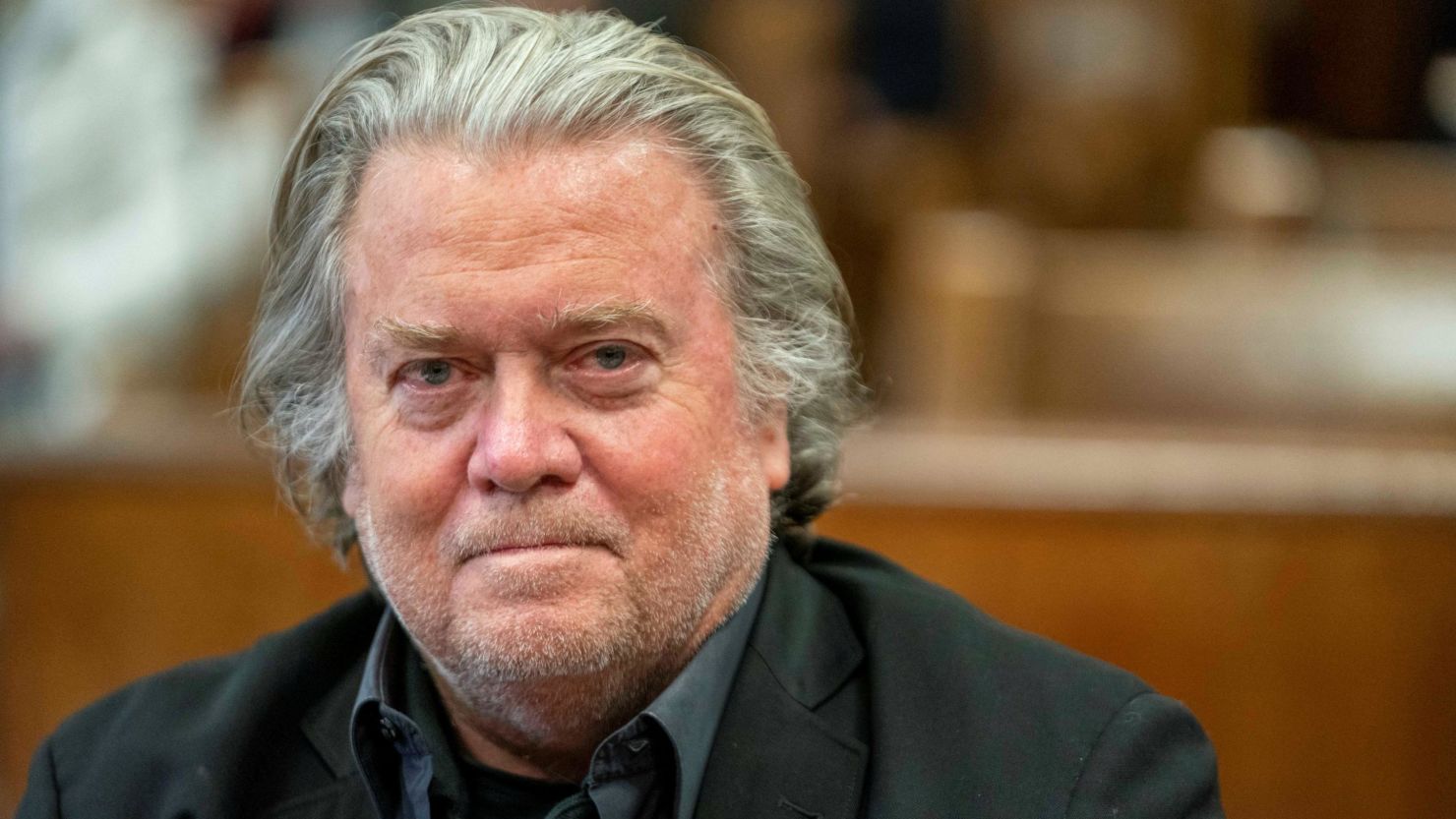A federal appeals court in Washington, DC, spent nearly an hour Thursday considering former Donald Trump adviser Steve Bannon’s attempt to overturn his conviction and sentence for contempt of Congress.
Bannon was convicted in July 2022 of two counts of contempt of Congress for defying a subpoena issued by the now-defunct House select committee that investigated January 6, 2021. The ex-adviser and strategist to Trump was later sentenced to four months in prison, though his sentence has been on hold while his legal challenges play out.
Some members of a three-judge panel of the US DC Circuit Court of Appeals appeared skeptical Thursday of arguments advanced by Bannon’s attorney, David Schoen, that the trial court judge who handled the criminal case erred when they declined to let Bannon assert executive privilege as part of his defense, and that the ex-adviser was simply acting on the advice of his then-attorney when he didn’t comply with the subpoena.
Pointing to a decades-old decision from the appeals court, Circuit Judge Brad Garcia asked Schoen why he doesn’t think that case “simply doesn’t tie our hands” with Bannon’s appeal.
“An advice of counsel defense is not relevant,” Garcia, a President Joe Biden appointee, said. “All that you need is a deliberate and intentional failure to respond to a subpoena. And the cases that you’ve relied on discuss the meaning of the term ‘willfully’ generally, but they’re not about (the statute at issue in the appeal).”
Circuit Judge Cornelia Pillard, an appointee of former President Barack Obama, later pressed Schoen on Trump’s alleged invocation of executive privilege, knocking down the attorney’s claim that it’s “presumptively valid” that Trump invoked privilege over Bannon.
“That’s so broad to say it’s ‘presumptively valid.’ Even at its broadest, where (the Office of Legal Counsel) has written, for example, that a former senior official can assert absolute testimonial immunity, it only covers communications within the scope of that former senior official’s service in the White House,” she said. “And none of the conduct at issue here was during Mr. Bannon’s service in the White House was it? None of it.”
“Right, judge, it was during the presidency,” Schoen replied.
“But not during Mr. Bannon’s service,” Pillard said. “Do you have any authority that suggests – any authority at all – that suggest that some kind of executive privilege or immunity would apply to conduct that postdates a person’s service?”
Schoen spent much of his time before the court arguing that Bannon defied the subpoena because his then-attorney Robert Costello told him that Trump had invoked privilege.
“Mr. Bannon acted in the only way he believed and understood from his lawyer that the law permitted him to behave in response to the subpoena,” he told the judges.
During a line of questioning from Circuit Judge Justin Walker, a Trump appointee, about what the House select committee wanted to ask Bannon, Schoen said he believed the panel had a “political agenda” and that he was unsure what it wanted from his client.
“I guess if you don’t know what they were going to ask how can you be so sure that everything would have been protected by executive privilege?” Walker asked.
“I can’t be that sure of it,” Schoen responded. “The advice might not have been correct that Bannon got. I can’t be so sure that everything was protected, but that’s the advice that Bannon got from his lawyer.”
Meanwhile, an attorney for the Justice Department told the judges that Bannon was “properly convicted” and urged the panel to affirm the lower-court judgement.
“The district court did not err in barring Bannon from putting on evidence or argument relating to his claim that he acted in good faith on advice of counsel based on the alleged assertion of executive privilege,” said DOJ attorney Elizabeth Danello.
“Given that there was no actual assertion of executive privilege; given that the subpoena of its face included a number of topics that could not possibly have included executive privilege; given that the committee laid out the procedures and repeatedly told Bannon he needed to follow them or risk contempt; and given the case law that does not recognize good faith as a defense then yes … he did have no justification for acting as he did,” she added later.
Bannon’s July 2022 conviction was a significant victory for the House select committee, which sought cooperation from an array of people it believed had information related to the events that unfolded following the 2020 election, including the attack on the US Capitol.
Bannon’s team did not mount a defense during the trial, and he did not take the stand.
When the House committee was demanding his cooperation, Bannon’s lawyer claimed that Trump’s stated assertions of executive privilege prevented Bannon from testifying or producing arguments – an argument the committee roundly rejected. Lawmakers noted that Bannon had for years not been a government official, while pointing to their interest in topic areas not involving conversations with Trump.
At the trial, however, Bannon’s arguments about executive privilege were not a central focus – even as his lawyers found ways to bring attention to the issue. They did so in the face of rulings from the judge deeming it largely irrelevant, under appellate precedent, to the elements of the contempt crime.
The now-disbanded committee also scored a victory in September when the Justice Department successfully prosecuted former Trump trade adviser Peter Navarro for contempt of Congress after he, too, defied a subpoena from the panel. Navarro was similarly barred from raising an executive privilege defense during his brief trial. Navarro’s sentencing in that case is set for January.
